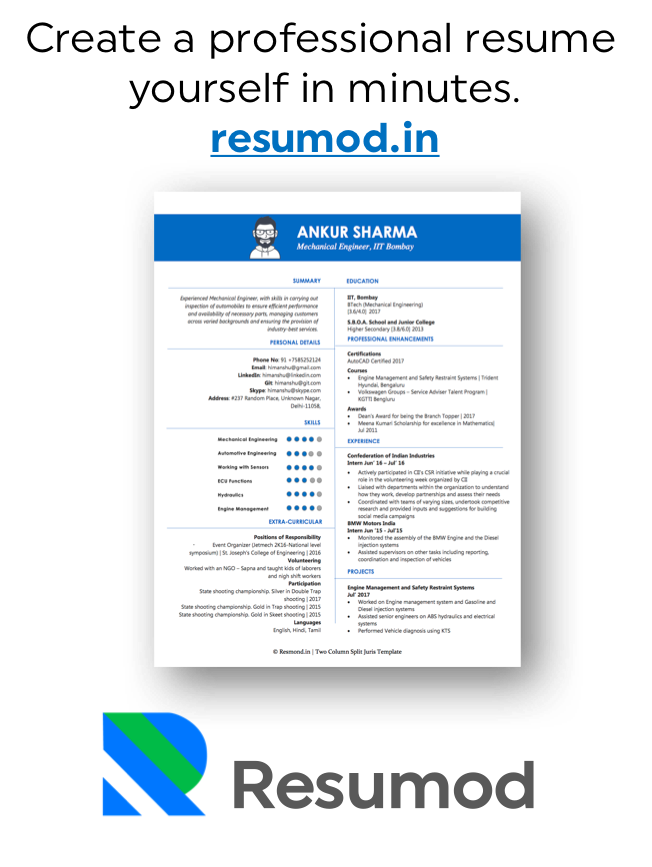The question you should ask yourself before you begin writing your SOP or Essay is, “What is your college looking for”? More specifically, how is the admission committee going to select some and reject other candidates on the basis of this essay! From the hundreds of applications received, only a few will make through to the actual course. These few will comprise an elite mix of students who come from varied backgrounds and bring some form of talent to the class. Then, the main purpose of your essay becomes to portray yourself as a unique individual with some kind of innate flair which could benefit the whole class.
Each of the items in your application – relevant work experience, recommendations, extra-curricular achievements add an additional facet to your candidature. Your essay or SOP brings it to life by connecting all these pieces together. It, therefore, becomes your best chance of impressing the admissions panel and securing that coveted seat. In fact the college realizes its importance and that is why each essay is read by two to often four or five people before a decision is finally taken on whom to select and whom not.
So what are the main things you need to keep in mind when you write your Essay application or SOP? Read on…
1. Clear Requirements. Before you embark on the journey of using your writing skills to create a fancy story about yourself, you need to be absolutely sure about what the school has asked for and why is this course so important for you. You have to first convince your own self how this school fits into your plans for the future and how you can use your past knowledge and experiences in making the next 1-2 years of studying worthwhile.
Speak to the present and past students and understand what the college and your course are about. Read the college brochure carefully and select what subjects you are planning to take up. Map these courses with your interests and also with the knowledge you have gained in the past. That will help correlate everything when you write down your essay.
2. Start positively and in an impactful manner. Your opening paragraph should arouse the interest of the reader. It can be a generic statement or a famous quote or you can simply start with your answer to the question itself. The point is to grab the attention of the reader from the opening sentence. You don’t have to shout or be dramatic, just start your story subtly and take the reader to the answer.
Also, always start positively. If there is a tragic incident you want to talk about in your essay, hold it for the later paragraphs. But, never try to gain sympathy from the admissions panel.
3. Be honest. Try to be as honest as possible in your answers and achievements. Make no mistake that the admissions committee has been there for a lot of years and has read applications in numbers you cannot imagine. So, don’t try to be something you are not and don’t try to tell them what you think they want to hear. If you write in your essay about your ambition to make the world a better place to live, your essay should reflect it through ample examples on the steps you have taken so far towards achieving your dream. Always be honest telling the admissions panel who you really are – it’ll do more wonders than you can think.
Fake stories, cooked up experiences and imaginary ambitions usually don’t make up past the admissions committee. In the rare instance they do pass the essay stage, one small interaction with the judges is enough to put candidates in testing waters. So, why try it!
4. Understand who you are and what value you can bring. The admissions committee tries to create an eclectic mix of students for the coming session. So they try to select candidates who offer varying attributes and values to the class. This means that the panel will try to filter in candidates not only based on their professional experiences and family backgrounds but also based on their personality types.
So try to bring out different aspects of your personality in your essay. You do not need to cook up a new personality type to impress your judges; that will never work. Neither will trying to showcase all the emotions you manifest. Rather, be original in telling the panel what kind of a person you really are and let them decide if you will make a good intake or not.
5. Self-Knowledge and a desire to learn. Your essay needs to be a well drafted story about who you are and where you started from and it should lead the reader to your ambitions and the future path you intend to take after completing this course. It is understandable if you are not aware of where you intend to go from here, after all who is?! But what is important is to show the committee that you have thought long and hard about something for the life that you intend to live and learnt about something from the life that you have lived till now.
Finally, you need to show your readers that you have a desire to learn from your experiences be it your education, business, arts, or from life itself. Even if you fail to choose a path of reckoning post completion of your course, your essay should portray you as a person who will be happy to do this course just for the sake of learning something new.



